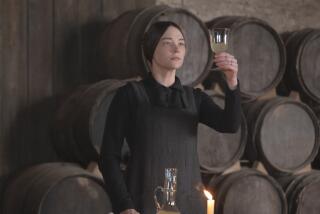Joker’s wild ride in Nicholson bio
For the last week, I’ve been intimately involved with Jack Nicholson. He’s both a charmer and a cliche. Passionate about truth in his art and a mendacious hypocrite in real life. Wildly generous, yet appallingly parsimonious. A pothead and a fine art collector. A priapic satyr and a romantic fool. I now have a singular insight into Nicholson. But I haven’t a clue about the real man behind the joker’s mask.
Former Times staff writer Dennis McDougal makes a similar concession in “Five Easy Decades,” his biography of the man he calls the “Biggest Movie Star in Modern Times”; he cleverly Teflons himself against charges of superficiality by asserting the unknowableness of his subject, arguing that, in part, Nicholson’s determined elusiveness has kept the public enthralled for 50-odd years. “The remarkable facts of Jack’s life,” McDougal writes, “are so mired with the fictions -- both deliberate and unintentional -- that just getting him into focus is a rigorous yet hypnotic exercise.”
As a result, perhaps, his book is a comprehensive and entertaining crazy quilt of quotations, trivia and behind-the-scenes Hollywood lore, a hold-no-punches paean that’s slight on analysis but rich in All Things Jack.
Born in Neptune City, N.J., McDougal reports, John Joseph Nicholson Jr.’s actual birth date and paternity are unknown. It’s also unclear when Nicholson discovered the shape-shifting roles of the women who raised him: His “older sister” and “mother” were, in fact, his mother and grandmother.
Virtually fatherless, young Nicholson developed a desperate reliance on female attention and approval. Too small to score on the high school basketball court, he learned instead the scoring tricks of the class clown.
In 1954, he took his swaggering wit to Hollywood. McDougal captures quite well the whirlwind of Nicholson’s hardscrabble years as a gofer in the MGM animation department, until -- in a story that may be true, or may be a bit of mythology, McDougal tells us -- he was “discovered” in an elevator by MGM producer Joe Pasternak. Nicholson threw himself into acting classes, local theater, a stint in the National Guard, some Beat/intellectual auto-didacting, bit parts in television, Reichian therapy, screenwriting, an early marriage, a lot of drugs and a lot of buddying up with other soon-to-be-famous actors, writers, directors and producers.
During the late 1950s and early 1960s, he kept feverishly busy with roles in B-horror films (learning from his early mentor Roger Corman the economy of budget and script). He also did Nouvelle Vague westerns, and recycled, “Wild One”-influenced biker flicks.
Fueled by “the visceral hunger of a New Jersey outrider born a bastard at the fringe of poverty,” Nicholson’s early career seemed aimed as much at writing and directing as acting. Then, in 1969, he and his buddies Dennis Hopper and Peter Fonda rode into the desert for a drugfest of a film shoot (“Easy Rider”) and so created “New Hollywood’s seminal moment,” as well as a movie star and a myth.
“Easy Rider” “was followed by “Five Easy Pieces,” “Carnal Knowledge” and, of course, “Chinatown,” and pretty soon the “Me Decade was in full swing, and so was Jack.” McDougal astutely frames Nicholson’s antihero persona as being in amazing sync with the culture and film industry zeitgeist. “Jack’s life story,” he writes, “parallels that of the modern entertainment industry -- from MGM to MySpace and from Universal to YouTube.”
Paradoxically, his anti-establishment image was matched by his business savvy. “He not only understood the vagaries of celebrity before he ever became a star himself,” McDougal observes; “he also understood the economic underpinnings that propelled the Hollywood rollercoaster from film to film.”
And there are the women. While “The Great Seducer’s” list of conquests is extensively detailed, the mystery of his sexual appeal is never explored in depth. About the closest McDougal comes is to quote Anjelica Huston: “The most attractive thing about Jack is his humor. And the fact that he’s never boring.”
Endless trysts, revolving uncommitted relationships, children born in and out of wedlock (some acknowledged, some not) -- all of this supports McDougal’s conclusions that the “ghosts of a past he never came to terms with always constrained intimacy.”
As time went on, McDougal notes, it “grew harder and harder to tell where the screen persona ended and the real Jack began.” His book marks Nicholson’s awkward transition from anti-establishment hero to establishment symbol, beginning with his “first major foray into self-parody” in 1980’s “The Shining.” Nicholson’s portrayal of a modern-day Satan in 1987’s “The Witches of Eastwick” “converted the supernatural comedy into uncomfortable autobiography at times,” but by 1989, when he starred in “Batman,” “Jack now embraced the Joker as an exaggeration of his own glowering id.”
McDougal writes with empathy and bemusement about the vain Nicholson’s gradual acceptance of himself as an aging Lothario, exemplified by his work in such films as “Terms of Endearment,” “About Schmidt” and “Something’s Gotta Give.”
“Five Easy Decades” is at times overly detailed. Do we need updates on how many cats Anjelica Huston had? If not especially illuminating, it’s always engaging. McDougal knows that nothing can dilute or deconstruct the genius or the mystique.
“I go to a Jack Nicholson movie hoping he’ll let me in on his secrets -- how to get girls, or how to get ahead in the world,” he quotes Gene Hackman. “He always seems to know something that I’d like to know myself. But he never tells me what it is. And yet I go, film after film, hoping that this will be the one where I find out the secret.”
Tara Ison is the author of the novels “A Child Out of Alcatraz” and, most recently, “The List.”
More to Read
Only good movies
Get the Indie Focus newsletter, Mark Olsen's weekly guide to the world of cinema.
You may occasionally receive promotional content from the Los Angeles Times.






